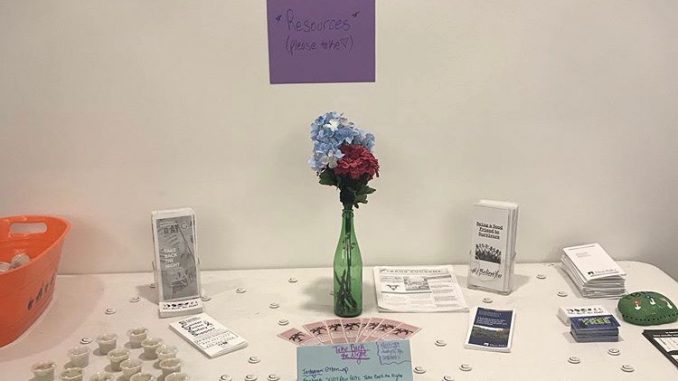
Many students do not read the Title IX law of their school, so they do not realize the manifold ways it could benefit them, whether or not they are an assault survivor.
In the front of the auditorium sits a panel of trained professionals sharing information about Title IX policies. In the back of the auditorium are tables with lavender, “Take Back the Night” pins, hot chocolate pouches that attendees could take home with them and brochures for where to get counseling.
This setup represents a form of activism and support that is crucial: a balance of facts, figures and procedures describing how to get justice as well as resources for psychological help and tokens that inspire self-care in survivors.
On the afternoon of Nov. 12, Shayonna Johnson, an ambassador for the Ulster County Victim Assistance Program, hosted a Title IX panel in Science Hall. The panel was open to the public and was meant to inform students about Title IX policies, protections students may not know about and the process of filing a case about sexual assault.
On the panel was Deputy Title IX Coordinator and LGBTQIA+ Coordinator Emma Morcone, Investigator of the University Police Department Officer Juanita Carson and peer counselor at the Oasis/Haven Dershanel JnoLewis.
Fourth-year sociology major Shayonna Johnson was the moderator of the panel and also singlehandedly orchestrated the event. She was inspired to lead the panel because she wanted to provide a platform for people to air their concerns and questions about Title IX at the school.
Title IX is a federal civil rights law that protects people from sex-based discrimination, including, but not limited to, sexual harassment and rape. Colleges and universities cannot alter any of the federal policies, but they are allowed to make their own additions, essentially forming their own version of Title IX.
Because Title IX can shift so much from school to school, it is important for students to be educated on the policies protecting them specifically.
Unfortunately, there are several misconceptions.
“Most students have a perception that Title IX is only for students who experience sexual violence like rape or being sexually harassed,” Johnson said. “Title IX also helps in resolving issues involving gender discrimination, stalking and domestic violence as well.”
Another commonly held misconception is what consent itself means. Morcone explained that SUNY New Paltz’s policy requires affirmative consent, which includes clear and voluntary agreement. In other words, “not fighting back in itself does not demonstrate consent.”
The panel also included information about filing a case. Students who feel ready are encouraged to begin a criminal process through the courts; however, the school also offers a judicial process that allows students to protect themselves at school.
The process includes a hearing where two faculty members and one student hear both sides of the story, view evidence and hear from witnesses to come to a conclusion about the case.
One benefit of undergoing a judicial process to attain justice is that some transgressions are not necessarily crimes, but are violations of the SUNY New Paltz Code of Conduct, so the perpetrator would still face punitive actions that they might not in a court.
The school offers a no-contact rule which is very similar to a restraining order, except it is issued by a dean of students as opposed to a judge. Students with no-contact orders are prohibited from any communication, including but not limited to communication in-person, over the phone, on or off campus, abroad or even prolonged eye contact. It also guarantees that students will never be placed in a class section together.
Violations of no contact orders result in judicial and academic consequences.
Officer Carson also said that survivors who wish to file criminal cases can fill out a form in person, online, over the phone or by email in order to report “any kind of nefarious activity.” They can also choose to be anonymous.
“I want to encourage folks to come forward… I won’t force you to do any sort of process,” Carson assured.
By thoroughly considering all of the options available, survivors can make the best decision for themselves and attain the best possible protections.

